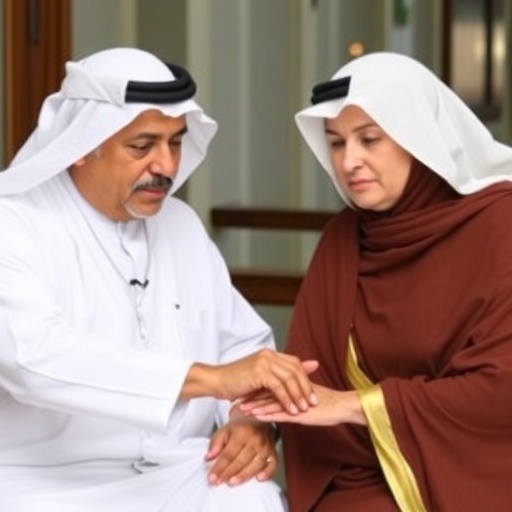The prevalence of sarcopenia among the aging population has garnered attention worldwide, particularly in regions experiencing rapid demographic shifts due to improved healthcare and lifestyle changes. Recent research has aimed to address this pressing issue through the cross-cultural adaptation and validation of tools specifically designed for the assessment of sarcopenia. One such significant study undertaken by Alqahtani et al. focuses on adapting and validating the Arabic version of the SARC-F survey; a concise, effective questionnaire that evaluates the presence and severity of sarcopenia in older adults.
The SARC-F tool, originally developed in English, has been successfully implemented in various populations, demonstrating its utility in identifying individuals at risk of sarcopenia. However, cultural and linguistic differences necessitate adaptations of these instruments to ensure they are relevant and valid in diverse contexts. In the context of Saudi Arabia, where there is a distinct cultural framework and lifestyle considerations, the need for an Arabic version of the SARC-F becomes crucial for effective utilization.
In their study published in BMC Geriatrics, the authors articulate the methodology employed to adapt and validate the Arabic version of the SARC-F. Their approach is multifaceted, including not only linguistic translation but also a thorough cultural adaptation process. This systematic method involves engaging stakeholders and healthcare professionals from the region to ensure that the questions resonate with the local population’s experiences and understanding of health and wellness.
The validation process involved rigorous testing to assess the reliability and validity of the Arabic SARC-F among Saudi older adults. The researchers employed statistical analyses that included assessments of both internal consistency and construct validity. The results indicate that the Arabic version of the SARC-F maintains the psychometric properties necessary for clinical and research applications, confirming its effectiveness as a screening tool in the Saudi demographic.
The implications of this study are profound. With the increasing aging population in Saudi Arabia, having validated instruments such as the Arabic SARC-F can lead to better identification of individuals at risk for sarcopenia. Early detection is vital as it allows for timely interventions, potentially mitigating the debilitating effects of sarcopenia which can significantly impair quality of life, independence, and longevity in older adults.
Furthermore, the cross-cultural adaptation of health assessment tools is an important aspect of global health research. It emphasizes the need for culturally sensitive approaches that honor the unique characteristics of each population. The study by Alqahtani et al. serves as a model for future research efforts aimed at adapting and validating health evaluation tools in varied cultural contexts.
In addition to being a significant contribution to the field of geriatrics, this research underscores the broader public health implications. As countries navigate the complexities of an aging population, stakeholders must prioritize resource allocation towards healthcare systems that can effectively address age-related conditions such as sarcopenia. By utilizing validated tools that reflect the language and cultural nuances of specific populations, healthcare providers can improve patient outcomes and enhance the overall health management of older adults.
The study paves the way for further research into the factors contributing to sarcopenia within different cultural and ethnic groups. Understanding the prevalence and risk factors specific to various populations can inform targeted interventions and educational initiatives aimed at improving the health of older adults. The collaboration among researchers, healthcare professionals, and community leaders is critical in fostering an environment conducive to health promotion and disease prevention.
In conclusion, Alqahtani and colleagues’ work provides a vital resource for clinicians and researchers focused on the geriatric population in Saudi Arabia. Their commitment to creating an accurate and culturally relevant tool demonstrates the importance of tailored health assessments in understanding and combating sarcopenia. As we move forward, the Arabic version of the SARC-F will undoubtedly play a key role in identifying at-risk individuals, informing treatment strategies, and ultimately enhancing the quality of life for Saudi older adults.
This significant advancement in sarcopenia research emphasizes a growing recognition of the need for culturally nuanced health measurement tools. As other regions follow suit with similar adaptations, the global health community can better equip itself to address the multifaceted challenges posed by an aging demographic, fostering a healthier future for older adults worldwide.
The journey does not end here; ongoing studies are necessary to explore the broader implications of findings such as these in shaping healthcare policies and practices. By expanding the knowledge base surrounding sarcopenia and its evaluation in various cultural contexts, we can build a more inclusive and effective approach to geriatric care and health promotion strategies.
As we reflect on the outcomes of this important study, it is crucial to recognize the collaborative nature of research that transcends borders. Engaging a diverse array of researchers, healthcare professionals, and community advocates ensures that the needs of older adults from all backgrounds are adequately addressed, promoting health equity in aging populations.
The validation of the Arabic SARC-F signifies a stepping stone towards a future where all older adults can be adequately supported in their health journeys, regardless of their cultural or linguistic backgrounds. This foundational work holds immense promise for advancing geriatric care in Saudi Arabia and serves as a beacon for other nations striving for similar enhancements in health assessment practices.
By prioritizing the adaptation of impactful health tools, we can build a more comprehensive understanding of geriatric health across various cultural landscapes, ultimately leading to improved health outcomes for aging populations everywhere.
Subject of Research: Cross-cultural adaptation and validation of the Arabic version of the SARC-F for evaluating sarcopenia in Saudi older adults
Article Title: Cross-cultural adaptation and validation of the Arabic version of the SARC-F for evaluating sarcopenia in Saudi older adults
Article References:
Alqahtani, B.A., Alenazi, A.M., Alshehri, M.M. et al. Cross-cultural adaptation and validation of the Arabic version of the SARC-F for evaluating sarcopenia in Saudi older adults. BMC Geriatr 25, 773 (2025). https://doi.org/10.1186/s12877-025-06349-y
Image Credits: AI Generated
DOI: 10.1186/s12877-025-06349-y
Keywords: sarcopenia, aging population, SARC-F, Arabic version, cross-cultural adaptation, validation, geriatric health.




